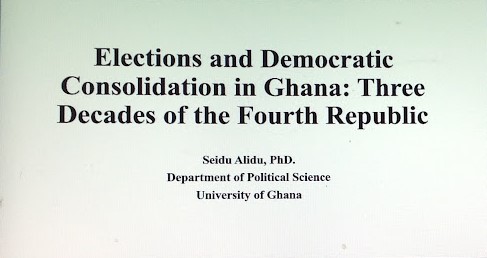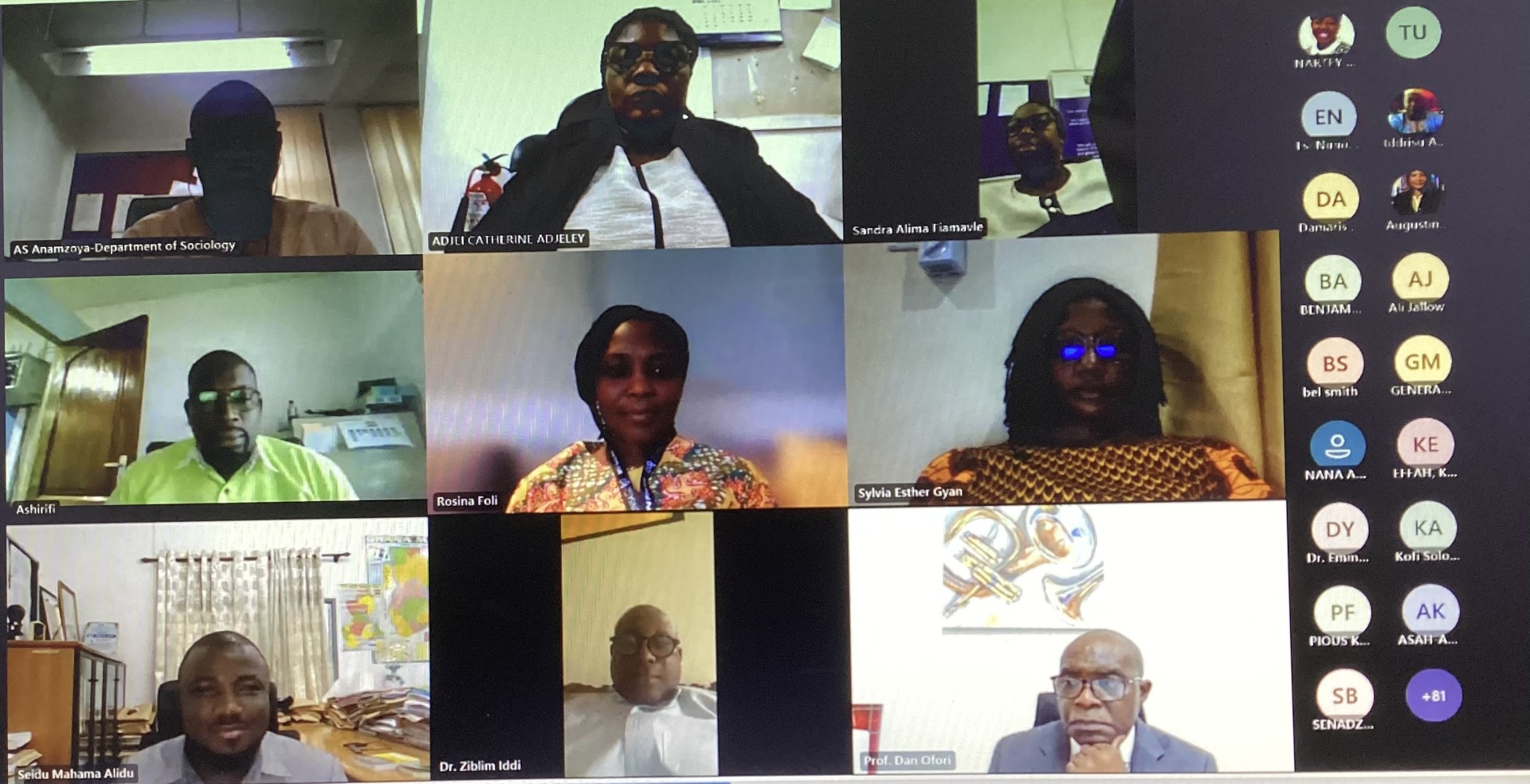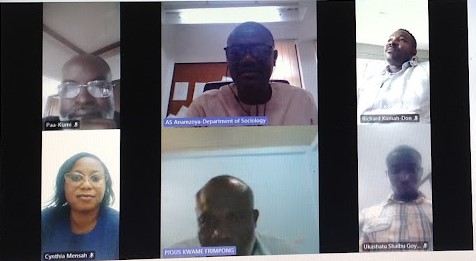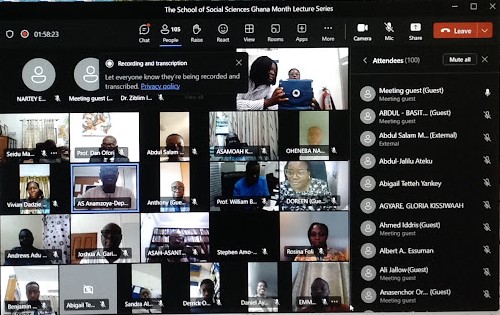The School of Social Science held its maiden Ghana Month Lecture Series on the theme, Elections and Democratic Consolidation in Ghana: Three Decades of the Fourth Republic in celebration of Ghana’s independence. The virtual lecture, which took place on Tuesday, April 16, 2024, was delivered by Prof. Seidu Alidu, Head of the Department of Political Science. There were over 100 participants in attendance comprising faculty, students, and other invited guests. The Deputy Registrar at the School, Mrs. Emelia Nartey welcomed attendees and stated that the School introduced the Ghana Month Lecture Series to provide lectures on topical issues taking place in the country. As such, the event will be held in the month of March each year. In her opening remarks, Prof. Mavis Dako-Gyeke, Dean of the School of Social Scienes mentioned that academia is largely missing in the celebration of Ghana month, despite the volumes of research conducted in this area across disciplines and the wealth of human resources that could speak to issues related to March 06, 1957. Therefore, the School of Social Sciences under the College of Humanities, University of Ghana has initiated the Ghana Month Lecture Series to bring to light the role of academia in celebrating this important month in the country’s history. Among the reasons why the school selected the theme, “Elections and Democratic Consolidation in Ghana: Three Decades of The Fourth Republic”, was the fact that 2024 is an election year. In addition, this election would serve as a tire breaker between the two major political parties who have governed the country during the fourth republic.
Prof. Daniel F. Ofori, Provost, College of Humanities
Briefing attendees on the political history of Ghana’s governance, Prof. Daniel Frimpong Ofori, the Provost of the College of Humanities, highlighted some remarkable gains of Ghana’s fourth republic. This included Ghana witnessing eight successful elections, elected five heads of 3 state, improvement in media freedom, expansion of civil liberties and the right to associate. He also outlined some challenges that affected the quality of elections and undermined democratic development such as political violence, monetization of elections, controversies with election voter register, and government intimidation. He noted that the lecture would critically examine the country’s democratic evolution, its dividends, and setbacks, with specific focus on the role of elections in Ghana’s democracy and the quest for consolidation. He applauded the School of Social Sciences for its initiative and hoped that the event would be held annually to enrich democratic discourse in the country.

Prof. Seidu Alidu, Head, Department of Political Science, School of Social Sciences, began the lecture by quoting from a letter sent from John Adams to John Taylor, which stated, “Remember, democracy never lasts long. It soon wastes, exhausts, and murders itself. There never was a democracy yet that did not commit suicide.” Explaining the statement, he alluded that citizens initiate democracy and their actions and inactions can lead to democratic suicide. Prof. Alidu defined democracy as ‘government for the people’ or ‘government for the majority’. It evolves from a non-democratic regime to a democratic regime. He also explained that democratic consolidation occurs when regular periodic transparent, free, and fair elections are held. However, elections alone do not make a country consolidated as it can lead to autocratization and democratization. Assessing Ghana’s electoral process under the fourth republic using the three main components: frequency, integrity, and voter behavior, Prof. Alidu argued that Ghana has passed the test of conducting reasonable and frequent elections at regular intervals, meaning that the country is moving towards consolidation. Ghana has also passed in terms of integrity, as the country experienced improvement in areas such as the autonomy of the electoral commission, the use of biometric register, and transparent ballot boxes, just to mention a few. Despite the positives, the country still faces some challenges like interference by the government, monetization and vote buying, doubtful electoral register, and government intimidation. Moreover, the country’s voter behaviour has been largely influenced by the dominant party and sociological voter behaviour models. Furthermore, measuring Ghana’s democratic performance using the free and fair election index, Prof. Alidu stated that the country scored well above the threshold of 0.500 since 1997. Hence, Ghana would be assessed as relatively free and fair country during elections with a lesser to no tendency of electoral clashes, electorates’ right being abused and dictatorial coercion. Thus, alluding that the country is moving towards consolidation. However, democratic consolidation transcends just elections. He discussed other variables used to assess democratic consolidation including corruption perception index, level of happiness, governance performance index, level of political stability and absence of violence, and economic freedom, among others. Regarding the country’s ability to fight corruption using the corruption perception index, Prof. Alidu stated that since 2020, Ghana has registered a score of 43 consistently indicating a perception of more corrupt as the rating fell below the 50 marks with a marginal ranking improvement of a digit or two. In addition. Prof. Alidu stated that the happiness level of Ghanaians has been rated as “unaffected” as the happiness index has been translated as neither happy nor sad in some years including 2012, 2018, and 2020. Nonetheless, it fell in the category of unhappy in 2016, 2017, and 2024. Prof. Alidu futher noted that Ghana performed well in three out of four indicators using the governance performance index. This was noted in the average scores of the four indicators. Ghana did well under governance (1.1), badly under security and rule of law (-7.1), remarkably well under foundation for economic opportunity (10.7) and very good under human governance (2.9) in absolute terms. He emphasized that political stability and the absence of violence could contribute towards creating an enabling environment for democratic consolidation to occur. Thus, using the political stability and absence of violence index, Ghana has always scored above the threshold of 50 from 1996 to 2022. Conclusively, Ghana would be assessed as a relatively peaceful country lesser to no tendency for political violence and political unrest. Prof. Alidu also noted that with the current score of 55.8, Ghana is mostly considered as an unfree country using the economic freedom index, thus, experiencing economic restriction and little to no liberalization. In conclusion, Prof. Alidu stated that elections are very critical to democratic consolidation. Though Ghana has made giant strides in terms of the quantity, quality, and meaning of election, he highlighted the need to improve the country’s Electoral Management Bodies (EMB) autonomy, governance performance, economic freedom, and reduce corruption with all seriousness. This could move the country a notch higher on the ladder of consolidation. In her closing remarks, Prof. Dako-Gyeke, thanked all for their participation in the maiden School of Social Sciences Ghana Month Lecture. She also expressed gratitude to Prof. Alidu for such an insightful and informative lecture. She remarked, ‘although Ghana has made positive strides, governments over the years have found ways to influence the climate of voting. Therefore, to what extent would you and I allow ourselves to be influenced?’, a question worthy of our consideration



Photograph of some Participants at the Virtual Lecture

